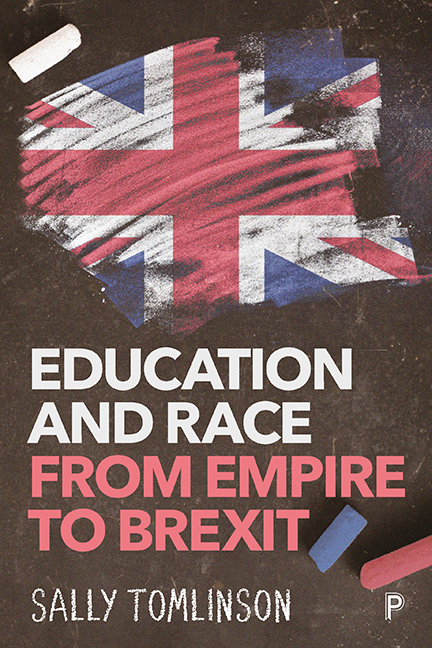Book contents
- Frontmatter
- Contents
- Acknowledgements
- List of abbreviations
- Introduction
- 1 Empire and ethnocentric education
- 2 Internal colonialism and its effects
- 3 Ending empire: Education for ignorance, 1945-1960s
- 4 Post-imperial anxieties and conflicts, 1970-90
- 5 Inequalities, a European Union and education markets, 1990-97
- 6 New Labour: Wars, race and education, 1997-2005
- 7 Not so New Labour: Race and education, 2005-10
- 8 A divided society: Race, class and education, 2010-16
- 9 A dog’s breakfast Brexit, 2016-18
- References
- Index
2 - Internal colonialism and its effects
Published online by Cambridge University Press: 27 April 2022
- Frontmatter
- Contents
- Acknowledgements
- List of abbreviations
- Introduction
- 1 Empire and ethnocentric education
- 2 Internal colonialism and its effects
- 3 Ending empire: Education for ignorance, 1945-1960s
- 4 Post-imperial anxieties and conflicts, 1970-90
- 5 Inequalities, a European Union and education markets, 1990-97
- 6 New Labour: Wars, race and education, 1997-2005
- 7 Not so New Labour: Race and education, 2005-10
- 8 A divided society: Race, class and education, 2010-16
- 9 A dog’s breakfast Brexit, 2016-18
- References
- Index
Summary
I am haunted by the human chimpanzees I saw along hundreds of miles of that horrible country … if they were black one would not feel it so much, but their skins, except where tanned by exposure, are as white as ours. (Charles Kingsley on Ireland, quoted in Curtis, 1968: 84)
The United Kingdom is not a country. Currently it is composed of four countries – England, Wales, Scotland and Northern Ireland. The people in the whole of Ireland, Wales and Scotland were internally colonised by the English over the centuries, both before and after England colonised overseas countries. The notion of internal colonisation was used by Lenin to describe groups in Tsarist Soviet Russia, by Gramsci to describe Southern Italy and by other writers to describe the conquest and attempted annihilation of American Indians (Hechter, 1975). But it also describes the way English elites variously conquered, laid claim to and took over these three countries, with subsequent conflicts over governance, land, culture, language and religion. It was 1707 before an Act of Union joined England and Scotland, and only in 1922 that a United Kingdom of Great Britain and Northern Ireland came into being, Wales having been annexed by England in 1536. It has already been noted that an understanding of the imperial past and how people think Britain is now seen by the rest of the world is largely a product of nostalgia and myths. Many ‘traditions’ in the three countries, as in the British Empire, were invented by rulers imposing their cultures and beliefs or by groups claiming or trying to sustain an identity (Trevor-Roper, quoted in Hobsbawm and Ranger, 1983). Education fostered the myths of heroic deeds that made a ‘Great’ Britain, but governments are still in the business of denying what actually went on during colonial times by removing or ‘losing’ archival material. Even files relating to the Falklands War in 1982 and ‘The Troubles’ in Northern Ireland from the 1970s have apparently been ‘lost’ (Cobain, 2017).
This brief chapter is not in any way a definitive history, but it is included because there is much ignorance about the creation of a ‘Great Britain’ and the internal wars, conflicts and atrocities that took place as it was all notionally united.
- Type
- Chapter
- Information
- Education and Race from Empire to Brexit , pp. 47 - 62Publisher: Bristol University PressPrint publication year: 2019



